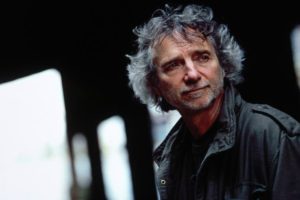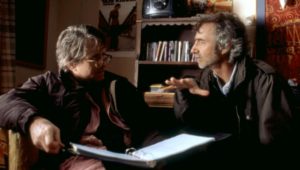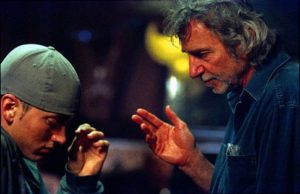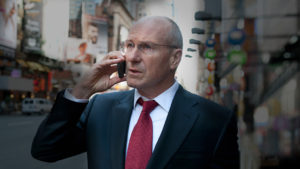Curtis Hanson, who died September 20 at age 71, was a decent man who made good and, quite often, better than good movies. It’s the sort of epitaph we’d pay several mortgages to own. Somehow it doesn’t say enough to compensate for a passing bereaving those of us who went to a movie theater in search of something more than distraction or anesthesia.
Carrie Rickey reminded me this morning of something Hanson once said about his own work: “I prefer stories of people who are, in a sense, trying to find better versions of themselves.” Hanson placed these personal quests front-and-center of his best work. Even with 1997’s L.A. Confidential’s pervasive squalor, layered betrayal and indiscriminate brutality competing for attention, you never wander far from the slow, painful education of dim, volatile LAPD detective Bud White (Russell Crowe’s star-making performance). You don’t share Hanson’s keen sympathy for him at the start, but before the end, you’re with them both.
American movies these days don’t work as hard as they once did to engage you in the lives of serial fuckups like Bud, or for that matter, Grady Tripp, the rakish, peripatetically stoned creative writing instructor from 2000’s Wonder Boys. As played by Michael Douglas, in his best performance (we can argue later), Grady’s “better version” of himself is stuck in neutral as he pokes away at the long-awaited follow-up to the novel that made him a cult hero. Among the things that distract him from finishing (besides his own bleary hubris) are his more gifted and troublesome students and the affair he’s been having with his boss’ wife (Frances McDormand).
Not all of his fuckups were guys, if you count Maggie Feller (Cameron Diaz), from 2005’s In Her Shoes, in which she cloaks her shame over her learning disabilities with heavy drinking, empty relationships and an inability to focus on anything. Nor were all of the protagonists necessarily fuckups, if you count Jimmy Smith Jr., Eminem’s semi-autobiographical alter ego from 2002’s 8 Mile, whose apparent gifts as a rap artist are constrained less by his own character flaws than by the formidable obstacles imposed by his outskirts-of-Detroit environment. He overcomes as impressively, and as credibly as Maggie, Grady and Bud.
None of these films were made all that long ago. Yet they now seem very far away when you begin to wonder who, if anyone, now works to fashion such humane, intelligent and well-wrought stories for the big screen. Toward the end, even Hanson had to slide over to television, delivering his last notable work, 2011’s Too Big to Fail, to HBO. It’s possible to include this account of the 2008 financial crisis in Hanson’s thematic wheelhouse if you consider the whole banking system as a fuck-up and U.S. treasury secretary Henry Paulson (William Hurt) the principal agent in retrieving some, if not all of the system’s better angels. Those who knew Hanson, or even met him (as I did) once could easily see Paulson as a surrogate for the director’s own easygoing competence and composure.
After Hanson, who? I’m still asking.





